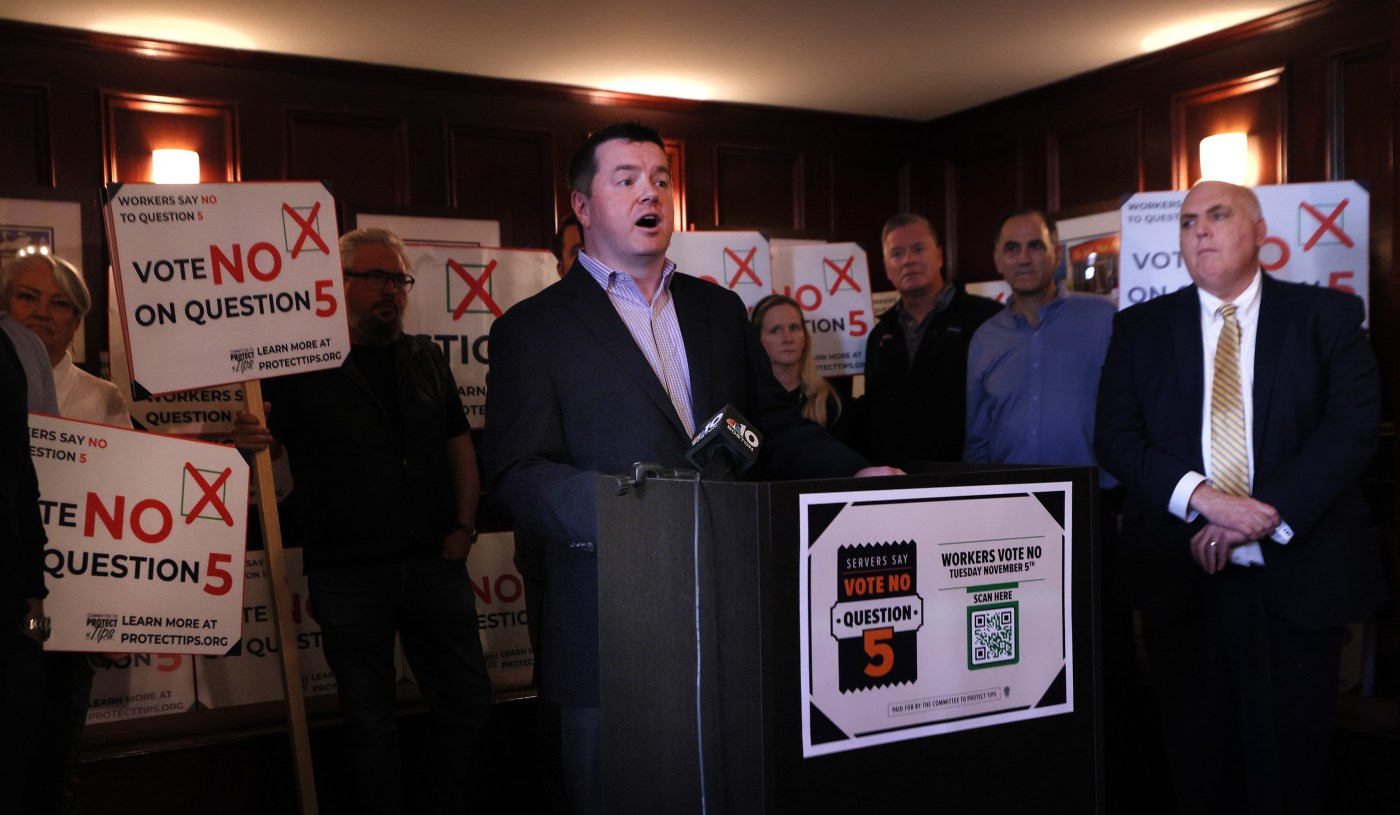
Menu prices would ‘surge’: 3 Boston city councilors endorse campaign against tipped restaurant worker wage hike
Three Boston city councilors threw their support behind a coalition urging a ‘no’ vote on Question 5, which would raise the minimum wage for tipped workers, joining a Southie bartender Monday who warned such a change would lead to a “surge” in menu pricing.
The endorsements from Councilors John FitzGerald, Ed Flynn and Erin Murphy were announced inside J.J. Foley’s Cafe Monday, while a counter-rally was held outside the South Boston Irish pub by restaurant employees and activists who are pushing for a ‘yes’ vote on the ballot.
“This isn’t a bipartisan issue,” FitzGerald said. “This is a math issue, and the math is this will be better for the workers that are collecting tips, this will be better for the consumer. We’re used to what this is, and there’s no use in changing something that isn’t broken.”
Flynn plans to introduce a resolution “in support of our local restaurants” at the Wednesday City Council meeting that touches on the ballot initiative. It cites reports that have noted “many local restaurant operators and servers remain opposed” to the proposed change, and states 91% of servers say they prefer the current system.
The resolution also cites research from the Political Economy Research Institute and Labor Center at UMass Amherst that found Massachusetts restaurants would have to increase menu prices by about 2% to make up the difference in staff pay — which may lead to staff layoffs or cause restaurants to shut down, Flynn wrote.
“We haven’t gotten to specifically what our cuts would mean, but absolutely, layoffs would happen; there would a surge in pricing,” Michael Foley, a marketing manager and bartender at J.J. Foley’s and the nephew of Councilor Flynn, said.
“We need only look a little bit south of us in Washington, D.C. This exact proposal has been in effect for nine months — it has been a disaster,” said Stephen Clark, president of the Massachusetts Restaurant Association, which is behind the coalition that formed in opposition to Question 5, Committee to Protect Tips.
If voters approve Question 5 on Nov. 5, the minimum wage for tipped employees would increase from $6.75 to a $15 base pay, over a five-year period, by 2029.
A recent poll from UMass Amherst/WCVB found that 61% of respondents favor and 27% oppose gradually increasing the state’s minimum wage for tipped workers, with higher support seen among young people under 30 (74%) than people over 55 years old (51%).
The practice of tipping would continue if the measure were to pass, but whether or not patrons would still be inclined to tip employees who make the standard minimum wage was a point of contention between those who oppose the ballot measure and those who support it at the presser and rally.
Vivian Anderson, 18, a Seattle native who attends Smith College in Massachusetts, was one of the roughly dozen attendees taking part in the “Yes on 5” counter-rally. While she doesn’t work, nor plans to work, in the food service industry, she spoke of her mother’s experience as a restaurant owner in Seattle, where tipped employees, per reports, are paid a minimum wage of $17.25.
“I’ve talked to my mom over the years,” Anderson told the Herald. “Her employees get treated way better by customers. They get tipped more by customers and she gets more business when she pays her workers a fair wage plus tips, because in Washington, and I think in general, frankly, consumers like to think that restaurants are treating service employees well.”
Asked to respond at the press conference, Clark questioned whether the remarks were made by a restaurant employee or someone who is being paid by the “activist group in California” he says is behind the ballot question.
“People speak with their wallets,” Clark said, citing findings from Cornell University that he said showed California, which mandates the same minimum wage for all employers, as having the “lowest tip percentage in the country.”
“So people might think they don’t change tipping habits but they absolutely do,” Clark said.
Murphy, an at-large councilor and former waitress, also touched on that part of the issue in her remarks, echoing what she said she’s heard from people in the restaurant industry, who are “worried that their livelihood is going to change.”
“I worry that if people know that they’re getting paid $15 an hour, a minimum wage, they may not tip anymore,” Murphy said. “If it was a slow day, the restaurant owners do have to pay the minimum wage. So, it already is true that our restaurant workers, our tipped workers, are paid the minimum wage if the tips don’t outright it.”
Erica Thomas, 25, who works at a restaurant in East Longmeadow, disagrees. She said the change would make her less dependent on tips, making her tips operate as a “bonus on top, as opposed to making that someone’s wage.”
Related Articles
Jaylen Brown: Renamed Boston bridge ‘very fitting’ honor for Bill Russell
Boston Mayor Wu agrees to limit commercial tax hikes with new legislation as part of discussions with business leaders
Experts: Falling commercial values could ‘wreck’ Hub finances
Boston set to rename bridge near TD Garden after Bill Russell
Michelle Wu, Senate tax hike negotiations at impasse over budget cuts
“I experience a lot of racist comments from guests,” Thomas told the Herald. “I experience a lot of sexual harassment from guests, and these are the people who are paying my bills, right? So, I’m not able to say anything about it or stand up for myself, for what’s right, because if I do, then I’m not going to be able to eat, I’m not going to be able to pay my rent.”
The other point of contention centered around a change opponents say will be made to the general practice of pooling tips, as stipulated by state law. Per Flynn’s Council resolution, the ballot initiative would allow tips to be shared with non-service and non-tipped employees, who are “usually paid a flat hourly rate above $15.”
Grace McGovern, 24, who works at a Boston brewery and coordinates outreach efforts locally, said tip sharing already exists in Massachusetts, is “very common,” and “has never been a concern for me.”
“It’s also not a mandate to involve tip sharing,” McGovern said. “It’s literally just after everyone is increased to a full minimum wage, the allowance for tip pooling expands to people who are currently not allowed to be involved in that tip pool. And that brings Massachusetts up to federal law.”
The group behind the ‘no’ campaign, Committee to Protect Tips, has reported more than $1.5 million in contributions, per the Office of Campaign and Political Finance, while the national advocacy group that brought the measure to the ballot, One Fair Wage, has raised more than $990,000.


